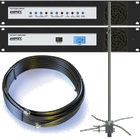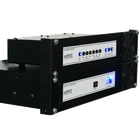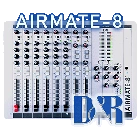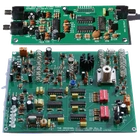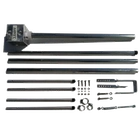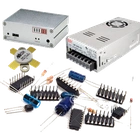User Manual and Installation of Folded Dipole Antenna
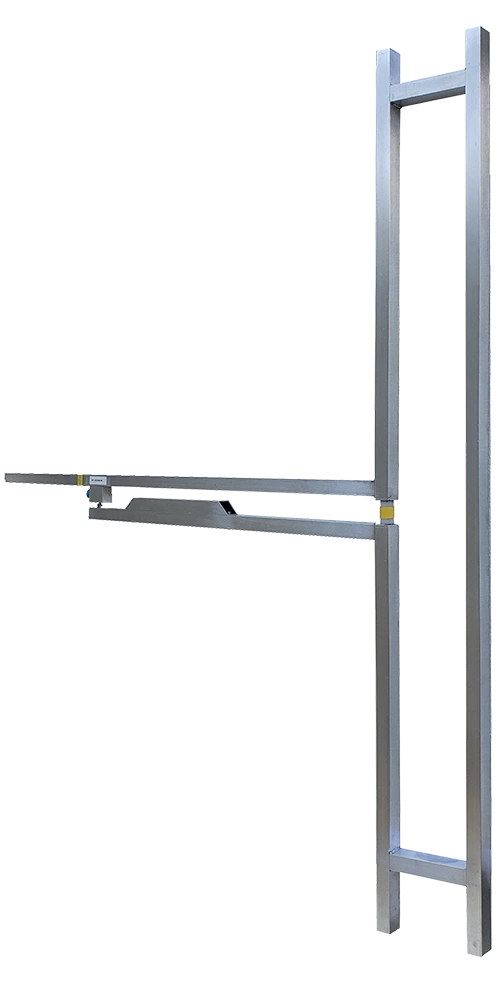
 IMPORTANT!
IMPORTANT!
The antenna is the most important part of the transmission system and must be correctly installed before proceeding further and before any transmission equipment is connected.
Under no circumstances should the antenna be mounted and used at ground level or within a few meters of personnel.
Ideally this antenna should be mounted at least 20 meters high and clear of any surrounding objects to get maximum range and more importantly to reduce risk of radio frequency radiation to personnel. When mounted at least 20 meters in height off ground and using 400 watts of transmitter power, power flux density measurements made at ground level directly under the antenna show less than 1 W/m2. Several European countries use a value for the power flux density of 10 W/m2 as a basis for considering whether or not an area is safe. The issue of radio frequency radiation limits is a contentious one and work in this field is continuing worldwide.
You are responsible for selecting the correct antenna for your application, installing it properly and ensuring the system maintenance.
INTENDED USE
This antenna is intended for FM broadcasting at a permanently pre-defined location with a license or authorisation from the radio spectrum regulator of your country.
NEAR POWER LINES
Following is a list of precautions to follow when installing the antenna if placement of antenna and cables is anywhere near power lines.
- Erect antenna on side of house or building as far away as possible from the power line.
- Avoid crossing antenna cables under electrical power lines.
- Do not attach antennas to towers, poles or similar structures carrying electrical power lines.
- If you are not experienced in installation of antennas, have experienced persons assist you.
- During installation, tie off antenna with rope so if it falls it can be diverted away from power lines.
- Avoid fastening antennas, especially self-supporting types, to old chimneys or to any chimney not designed to take such stress. Forces created by a strong wind may be sufficient to topple both chimney and antenna.
- Make sure antennas have been properly grounded and provided with other necessary lightning protection.
PACKING CHECKLIST
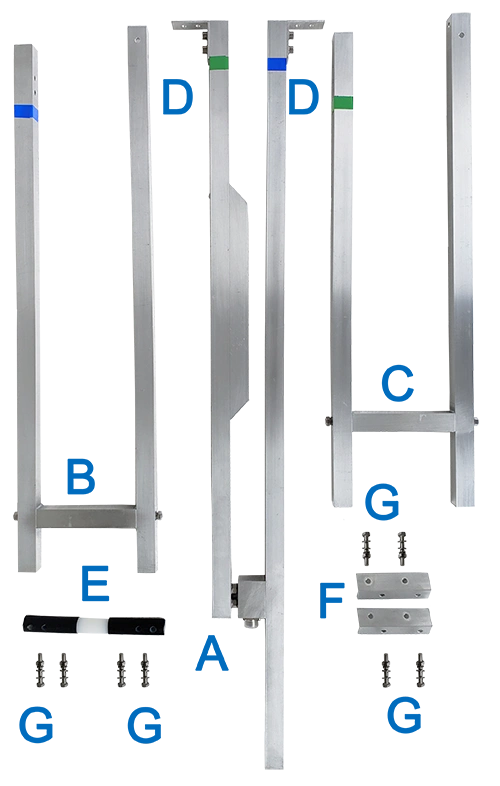
| Qty | Item |
| 1 | A and D. Boom, RF connector, 1/4 wave match and balun, marked BLUE and GREEN |
| 1 | B. BLUE Top fold section. |
| 1 | C. GREEN Bottom fold section |
| 1 | E. 22mm diameter insulator |
| 1 | F. Joining clamp (2 x (4 inch x 1/16 inch x 1 inch angle) |
| 12 | G. M6 x 50 screw, two M6 plain washers, M6 spring washer and M6 nut |
| 1 | H. Mast fixing clamps ( 2 x (4 inch x 2 inch x 1/8 inch angle) |
| 2 | H. U-bolts - DEFAULT SIZE 38mm or 1½ inch with M8 2 flat washers, 2 spring washers and 2 nuts. |
H Mast Clamps
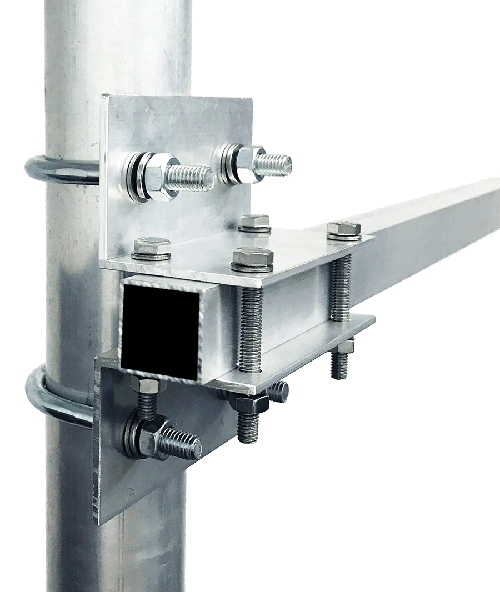
ASSEMBLING THE FOLDED DIPOLE
Tools You Will Need
PVC insulation tape or Self Amalgamating Tape.
Metric Tape Measure.
10mm Spanner.
13mm Spanner.
1. Assemble The Insulator
Pass the E 22mm diameter insulator through the tube marked GREEN or BLUE on the folded section. Push it all the way through until it appears in the middle of the tubes as shown here.
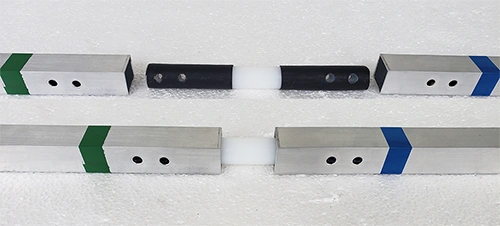
2. Assemble The Complete Folded Section
Take the B top fold section
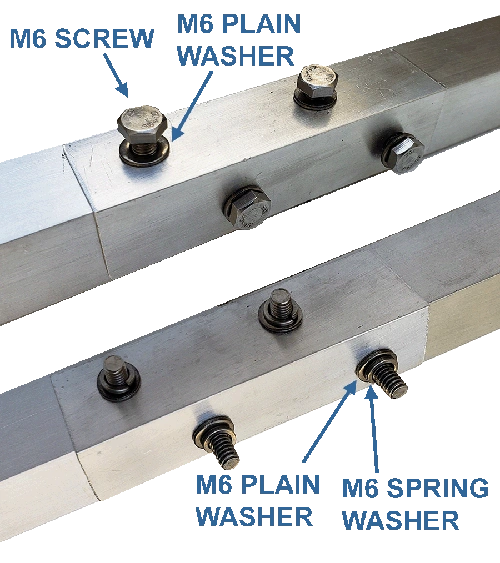
Fit and tighten the four M6 nuts to the M6 screws using a 10mm spanner as shown here.
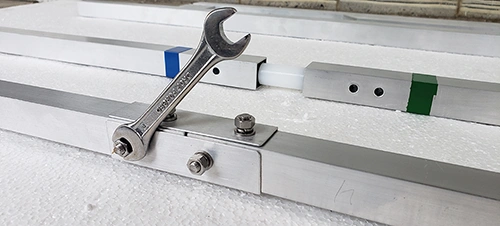
When this is complete the folded section should look like this.

3. Join The Boom And The Folded Section
Take the folded section and join it to the A boom section using the two D "L shape" joining brackets already attched to the boom and the four G M6 screws, plain washers, spring washers and nuts. It's important that as shown in the image below 1.) The GREEN and BLUE parts go together and 2.) The M6 screws and washers are placed exactly as shown, spring washer next to the nut and the plain washer next to the tube.
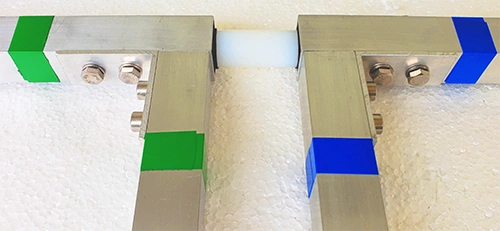
Using the 10mm spanner, tighten the M6 screws between the folded section and the boom. There should be no slack in the whole assembly, it should be tight, firm and rigid.
The folded dipole is now ready to mount to the tower or mast.
TOWER MAST INSTALLATION
1. Using the parts in H assemble the mast clamp as shown in the image below. Fix the boom of the folded dipole to the tower / mast using the mast clamp. For the lowest VSWR / reflected power make sure the distance of 100cm is maintained between the tower / mast and the folded section as shown in the image below.
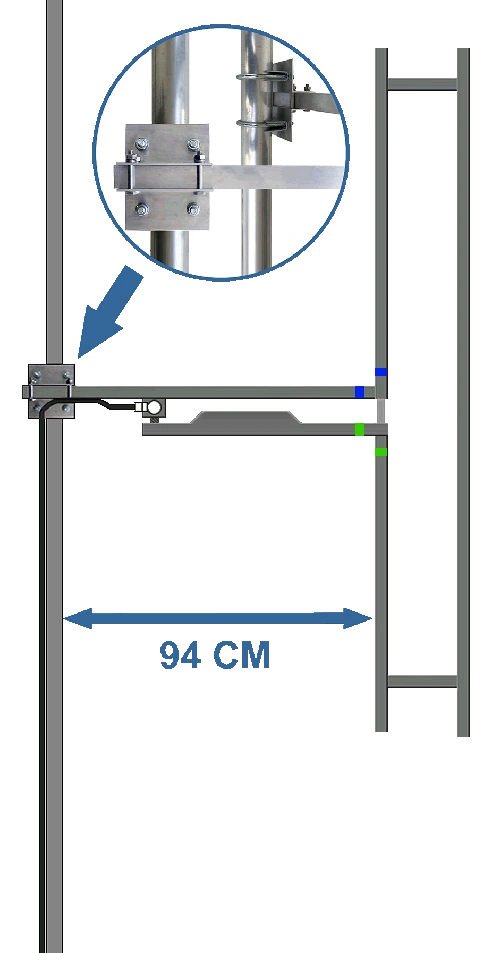
2. Connect the main feeder cable from the transmitter to the RF connector on the folded dipole antenna.
3. Wrap PVC or better Self Amalgamating tape tightly around and over the plug to waterproof them.
4. Securely fix the coaxial cable using PVC tape or large cable ties to the tower / mast. Make sure the cable is not going to flap around in the wind.
5. Make sure that all fixings are tight and are not going to work loose over time with wind.
VSWR PERFORMANCE
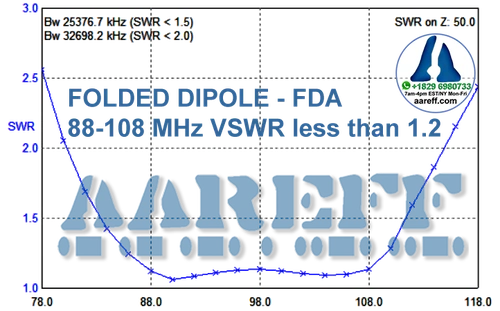
SPECIFICATION AND DESIGN
| Gain | 2.1 dBi |
| Freq Range | 87.5 to 108 MHz |
| Bandwidth | 21 MHz |
| VSWR | 1.2 max |
| Max Power | N type Female 800W 7-16 DIN 3kW |
| Construction | Aluminium, Fibre Glass, Resin and Stainless Steel |
| Input Z | 50 ohm unbalanced |
| Polarization | Vertical |
| Weight | 2 Kg |
3D VERTICAL PATTERN
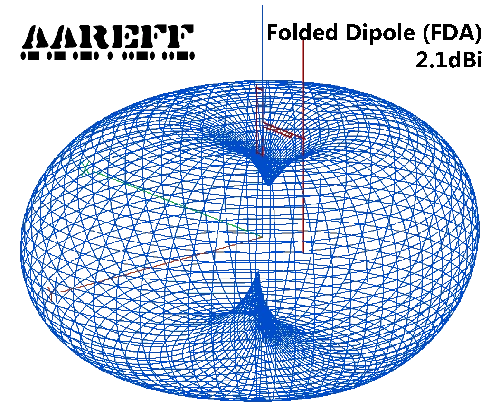
H PLANE
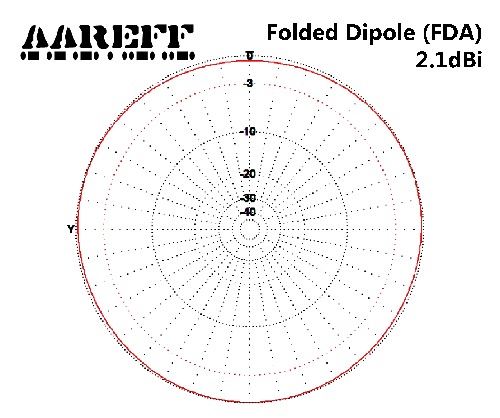
E PLANE
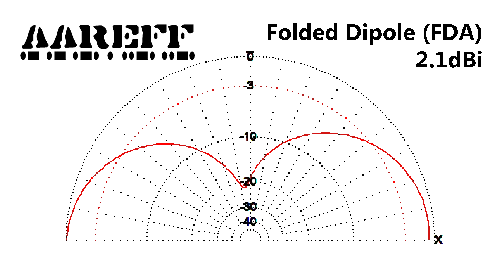
EM COMPATIBILITY
When writing this manual there was no EU directive regarding the EMC (Electro Magnetic Compatibility) of Band II VHF broadcast antennas, however in our view there are some potential EMC compatibility issues that need to be addressed when installing this antenna system. On completion of the antenna installation check;
1. All the cables entering the connectors are tight and properly crimped or soldered
2. All the connectors are screwed in tight and sound.
3. PVC insulation tape and/or self amalgamating tape are wrapped around all the connectors to stop water entering the connector and the inside of the body of the cable.
If any cables are loose or there are bad connections this can cause some non-linear resistance, diode action or some small arcing. When this happens it creates EMC disturbance (arcing and crackling sound) across a wide frequency spectrum.
MAINTENANCE
Because antennas are passive devices maintenance requirements are low, however don't accept low as being none existent, some periodic inspections are required.
Always following a heavy storm or extreme weather condition an inspection should be done and as shown in the table below.
| WEEKS | Building Roof | Light Duty Tower | Heavy Duty Tower |
| 13 |  |
||
| 26 |  |
 |
|
| 39 |  |
||
| 52 |  |
 |
 |
LEGAL ADVICE
We sell this equipment to professionals and organizations in good faith it will be used correctly and legally. Most countries in the world require licensing for this antenna to be used with a transmitter. It is the customer's responsibility to check relevant laws, directives, regulations and licensing requirements before putting this product into service with an antenna system. You, the customer or user agree to defend, indemnify and hold harmless Aareff Systems Limited, its employees and agents, from and against any claims, actions or demands, including without limitation legal and accounting fees, alleging or resulting from improper or unlawful use of this equipment.
(C) 2023 AAREFF SYSTEMS
ALL RIGHTS RESERVED. Aareff is a trademark of Aareff Transmission. All contents of this document including, but not limited to the images, logos, text, illustrations are protected by copyrights, trademarks and other intellectual property rights which are owned and controlled by Aareff Transmission Systems or by other parties that have licensed their material to Aareff Transmission Systems. This document in part or whole may not be copied, reproduced, republished, uploaded, posted or distributed in any way, including by e-mail, ftp or any other electronic means
Every care has been taken in the preparation of this document, errors in content, typographical or otherwise, may have occurred. If you have comments concerning its accuracy, please contact us.

 +1 829 698 0733
What Do You Need? Talk To Us
+1 829 698 0733
What Do You Need? Talk To Us
